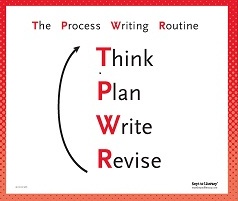Teaching Revision – Where do I begin?

In order to address this question, let’s start with some of my beliefs about writing:
- Writing is struggle.
- Writing is a craft that can be learned.
- And real writing happens in revision.
These beliefs mean that as teachers we must explicitly teach the revision moves that our students so desperately need, but we also need to understand that we serve our students more effectively when we model the authentic struggle of writing.
Writing is a process, and that process is full of messy stages. At Keys to Literacy we use the Think, Plan, Write, Revise acronym to help students recall the stages that successful writers move among. There is a mountain of research that has confirmed for quite some time that strong writers move among these stages of the writing process in a dynamic way.
But too many of our students don’t see the Write stage (drafting) as a start; they see it as the finish line.
When students sit down to write and feel unsure, and scared, and they don’t have anything to say that is worth writing about – they are in good company. All writers – even the experienced novelists and Pulitzer Prize winners – write with uncertainty when they are drafting. Bestselling author Anne Lamott, reflects about the drafting stage in her honest and funny book: Bird by Bird: Some Instructions on Writing and Life:
“I know some very great writers, writers you love who write beautifully and have made a great deal of money, and not one of them sits down routinely feeling wildly enthusiastic and confident. Not one of them writes elegant first drafts.”
“For me, and most of the other writers I know, writing is not rapturous. In fact, the only way I can get anything written at all is to write really, really sh*#ty first drafts.”
In the draft stage, writers suffer the same way as nonwriters, but what successful writers do, that many of our students do not, is revise. They rewrite. Lamott goes on to reflect “But because…I had been writing for so long, I would eventually let myself trust the process…”
Our students do not trust the process. Most don’t even understand the stages in the process. When our students experience the drafting stage as the finish line, writing is even more anxiety provoking because there is an unnecessary pressure on the writer. The expectation of perfection on the first draft is paralyzing at best. Great writing doesn’t happen in the first draft, and students must not expect it to, but that expectation will not shift unless they begin to believe in the value of the revision stage.
Most students I have worked with not only lack understanding about revision, they have revision war stories. They speak of the times when they have been told to “partner up” in order to “exchange papers” so they can “revise” – only to be left in the foxhole with no battle plan and no ammunition. Their motivation and engagement has been an unintended casualty because the “revision” stage as they have known it has not resulted in improvement of their writing. So how do we change this? As teachers, where do we begin?
Here are two important starting points:
Establish the importance of revision by starting small.
Draft a paragraph about something your students are studying. It can be argumentative, informational or narrative. Over the course of the week, display the draft paragraph each day beginning with your original draft on day one. Model by thinking aloud in front of your students how you would go about making one or two focused revisions, and then put it away. The next day improve it again. And then again. Repeat this until the end of the week when you compare the revised paragraph to the original.
You must establish the importance of revision by giving them experience with its success. The only way they will believe you when you say “real writing happens in revision” is if you prove it. And you’ve got your work cut out for you. They have battle wounds.
If a paragraph is overwhelming – most likely due to the skill level of your writers, or their level of reluctance – start with a sentence, and follow the same recommendation. Spend the week revising a single sentence. It can be as powerful.
Debunk the myth that you are either a good writer or you are not.
Carol Dweck, Stanford psychology professor and one of the most influential researchers in the field of motivation, has been gathering important findings about student motivation for over 30 years. In her book Mindset (a must read for any teacher), Dweck proposes that people have either fixed mindset or growth mindset. Students with fixed mindset are going to believe that their writing ability is fixed – they are naturally talented at writing or they are not. Students with growth mindset believe that their writing abilities can be developed through effort.
This is significant because writing is struggle! Students with fixed mindset are operating under the false assumption that successful writers have not put forth a great deal of effort, including the effort needed when revising. The good news is Dweck’s research has also made it clear that we can influence students’ mindsets, and I think there is perhaps no better place to start doing this than when you begin teaching revision.
Debunking the myth is a process, but Mindsetworks.com offers free resources, including an article for students titled “You Can Grow Your Intelligence” that can help you get started. Through class discussion, connect the main points of this important article to the ideas I mentioned earlier: writing is struggle, but writing can be learned.

 Shauna serves as Vice President and Senior Director of Professional Development at Keys to Literacy and is an integral member of the senior management team. With over 20 years of experience, Shauna has dedicated her career to advancing literacy achievement for all students. Her journey began as a classroom teacher and literacy interventionist, where she developed a deep commitment to fostering student success.
Since joining Keys to Literacy in 2007, Shauna has played a pivotal role in shaping the organization’s professional development offerings and initiatives. She has held a variety of key positions, including national trainer, relationship manager for strategic accounts, contributing editor, and a principal contributor to the development of several professional development programs. In her current leadership role, Shauna oversees a team of national consultants who deliver professional development services to schools, districts, and state education departments nationwide. Additionally, Shauna directs and manages the Certified Facilitator program, guiding educators and education leaders through the implementation of Keys to Literacy’s hybrid online learning model.
As a frequent speaker at state and national literacy conferences, Shauna shares her expertise and passion for literacy, delivering engaging content that inspires and empowers educators to elevate classroom instruction and improve student outcomes. She is also a contributing content creator for Reading Universe, an online, step-by-step professional development pathway for teachers, paraprofessionals, and reading coaches to learn more about evidence-based reading instruction — and then translate it into classroom practice that will complement any curriculum.
Shauna holds a Bachelor of Arts in Elementary Education and a Master of Science in Language and Literacy Instruction.
Shauna serves as Vice President and Senior Director of Professional Development at Keys to Literacy and is an integral member of the senior management team. With over 20 years of experience, Shauna has dedicated her career to advancing literacy achievement for all students. Her journey began as a classroom teacher and literacy interventionist, where she developed a deep commitment to fostering student success.
Since joining Keys to Literacy in 2007, Shauna has played a pivotal role in shaping the organization’s professional development offerings and initiatives. She has held a variety of key positions, including national trainer, relationship manager for strategic accounts, contributing editor, and a principal contributor to the development of several professional development programs. In her current leadership role, Shauna oversees a team of national consultants who deliver professional development services to schools, districts, and state education departments nationwide. Additionally, Shauna directs and manages the Certified Facilitator program, guiding educators and education leaders through the implementation of Keys to Literacy’s hybrid online learning model.
As a frequent speaker at state and national literacy conferences, Shauna shares her expertise and passion for literacy, delivering engaging content that inspires and empowers educators to elevate classroom instruction and improve student outcomes. She is also a contributing content creator for Reading Universe, an online, step-by-step professional development pathway for teachers, paraprofessionals, and reading coaches to learn more about evidence-based reading instruction — and then translate it into classroom practice that will complement any curriculum.
Shauna holds a Bachelor of Arts in Elementary Education and a Master of Science in Language and Literacy Instruction.
Love this! Encapsulates everything you were trying to get across to the students at SMART, yesterday. Will share with the morning group when I visit them tomorrow. Had to reschedule that group due to your visit.
You write beautifully!! Your struggle was well worth it:))
Jennie